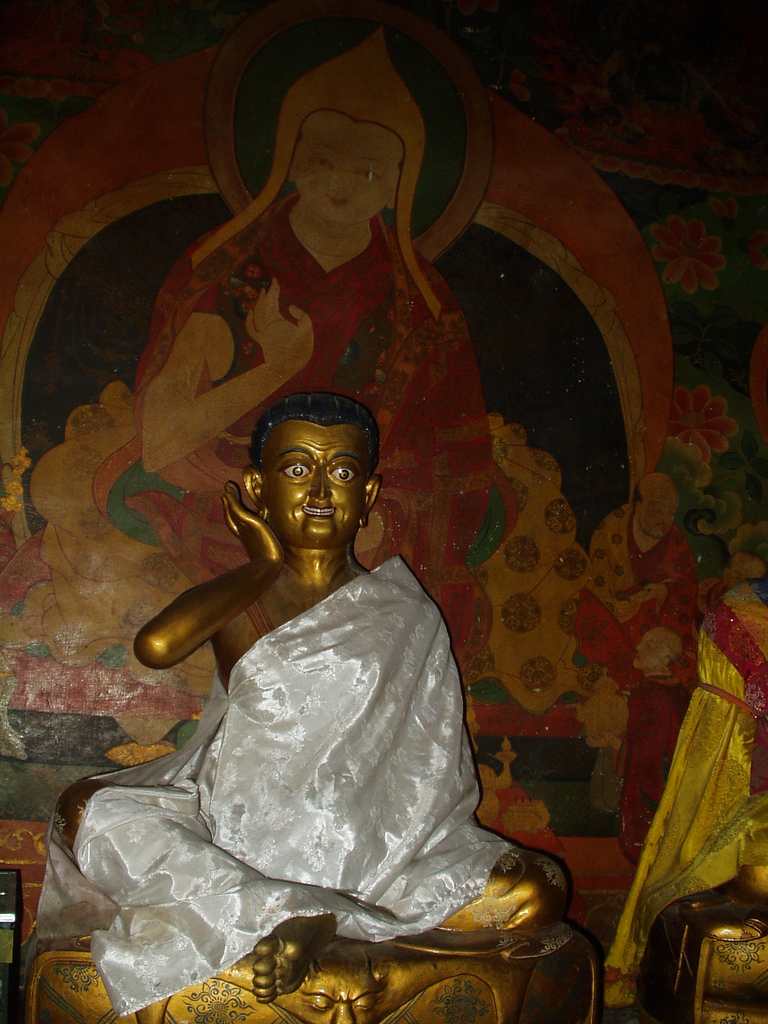Milarepa frases e citações
Milarepa: Frases em inglês
Song to the Hunter
Contexto: You man with a human body but a demon's face,
Listen to me. Listen to the song of Milarepa! Men say the human body is most precious, like a gem;
There is nothing that is precious about you.
You sinful man with a demon's look,
Though you desire the pleasures of this life,
Because of your sins, you will never gain them.
But if you renounce desires within,
You will win the Great Accomplishment. It is difficult to conquer oneself
While vanquishing the outer world;
Conquer now your own Self-mind.
To slay this deer will never please you,
But if you kill the Five Poisons within,
All your wishes will be fulfilled.
“In my youth I committed black deeds. In maturity I practised innocence.”
As quoted in The Life of Milarepa: A New Translation from the Tibetan (1977) by Tsangnyön Heruka, as translated by Lobsang P. Lhalungpa, p. 12
Contexto: In my youth I committed black deeds. In maturity I practised innocence. Now, released from both good and evil, I have destroyed the root of karmic action and shall have no reason for action in the future. To say more than this would only cause weeping and laughter. What good would it do to tell you? I am an old man. Leave me in peace.
“To say more than this would only cause weeping and laughter.”
As quoted in The Life of Milarepa: A New Translation from the Tibetan (1977) by Tsangnyön Heruka, as translated by Lobsang P. Lhalungpa, p. 12
Contexto: In my youth I committed black deeds. In maturity I practised innocence. Now, released from both good and evil, I have destroyed the root of karmic action and shall have no reason for action in the future. To say more than this would only cause weeping and laughter. What good would it do to tell you? I am an old man. Leave me in peace.
“Conquer now your own Self-mind.”
Song to the Hunter
Contexto: You man with a human body but a demon's face,
Listen to me. Listen to the song of Milarepa! Men say the human body is most precious, like a gem;
There is nothing that is precious about you.
You sinful man with a demon's look,
Though you desire the pleasures of this life,
Because of your sins, you will never gain them.
But if you renounce desires within,
You will win the Great Accomplishment. It is difficult to conquer oneself
While vanquishing the outer world;
Conquer now your own Self-mind.
To slay this deer will never please you,
But if you kill the Five Poisons within,
All your wishes will be fulfilled.
From the song offered to Geshe Tsaphoua, as quoted in Meditation Techniques of the Buddhist and Taoist Masters (2003) by Daniel Odier, p. 104 https://books.google.it/books?id=9BXTAwAAQBAJ&pg=PA104
“Do not spend your life committing sinful deeds;
It is good for you to practice holy Dharma.”
Fonte: Ref: en.wikiquote.org - Milarepa / Quotes / The Hundred Thousand Songs of Milarepa: The Life-Story and Teaching of the Greatest Poet-Saint Ever to Appear in the History of Buddhism / Song to the Hunter
